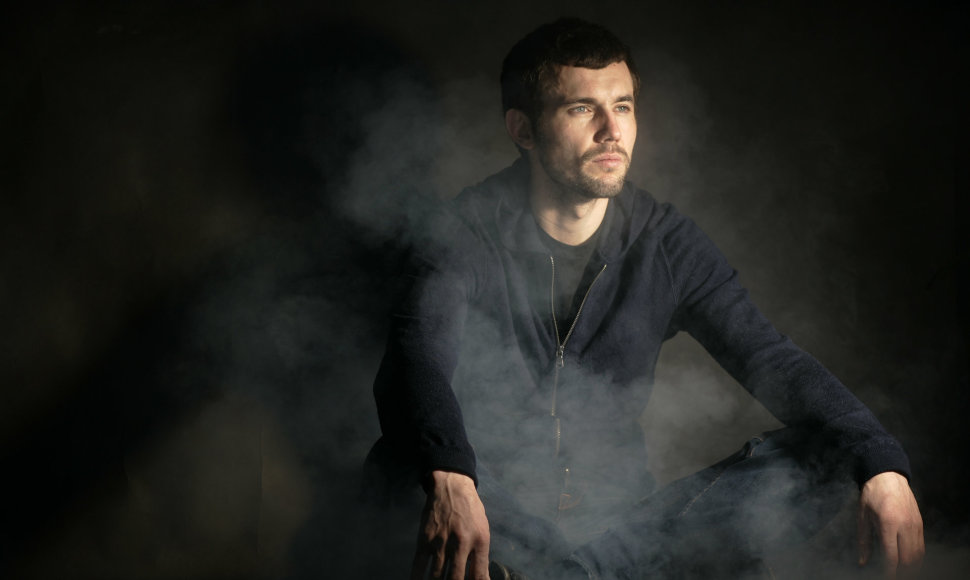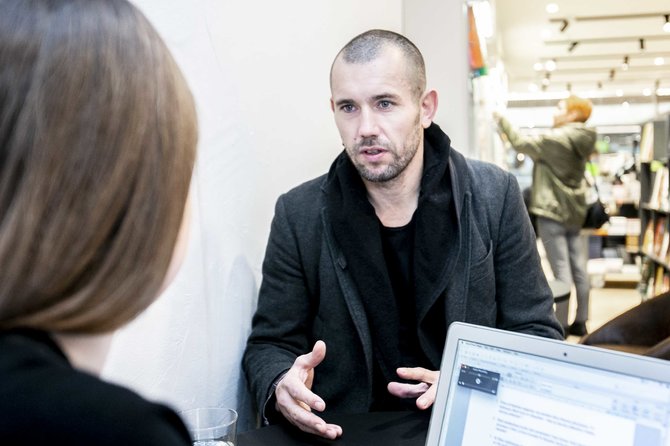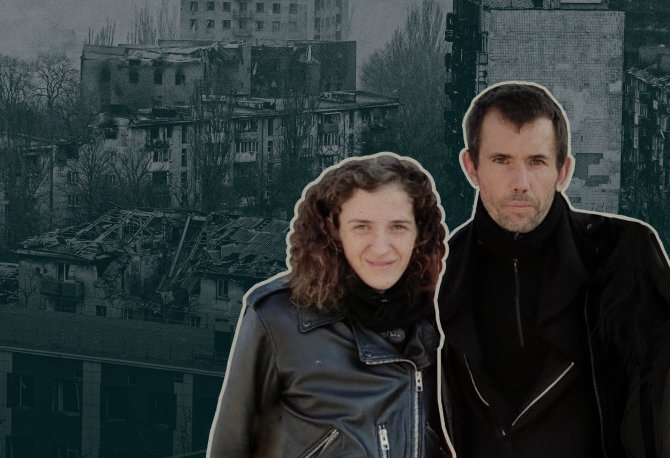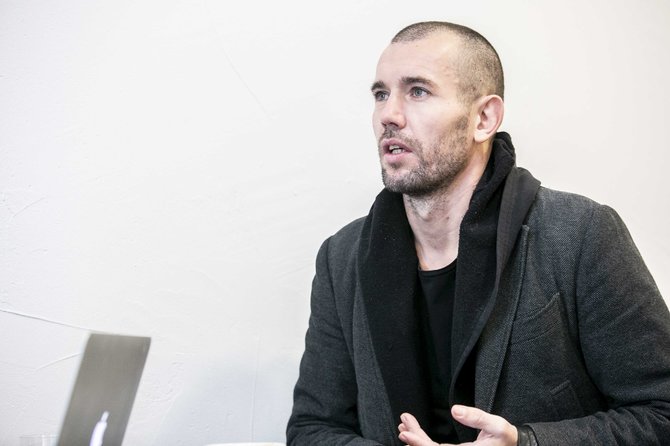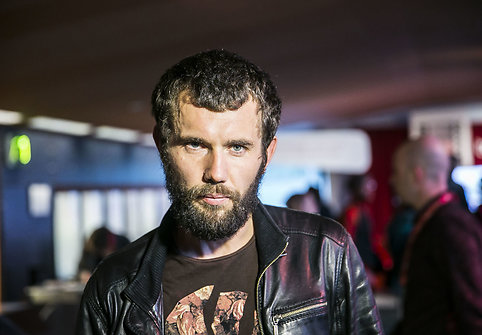3rd of March: Uganda
Mantas told me before that he is fed up by the war, and that we will not go to such places ever again. But since February 24th, when everything started in Ukraine, we kept the track of the news and in our minds, we were fully involved in what is happening. March 3rd was my birthday, so we took a day off. When we came back in the evening, relatives were texting me with greetings "Happy birthday, Hanna", only later I found out that they were hiding in the basements…
I remember as I got nervous and went to my office, Mantas went to the bedroom. I thought I will relax and we'll go to sleep soon. Then I received a message: "come in". He was reading the news in distress. He would constantly remember his film about Mariupol, the shots and material that never made it into the final film. He always wanted to reedit for this situation to understand how Mariupol feels now. He was imagining people seeking shelter in Mariupol’s drama theatre, people he knew were alive and trapped in there.
He shows me the latest news and says: "I feel that I have to go and film there, in Mariupol". I said that I will go with him and offered to go for a smoke and discuss the risks. It was after midnight on the 4th of March. We both knew that we might never return, but we still wanted to go.
13th of March: Poland
Mariupol was under siege, so we wanted to help the people there as well. They had to survive there without food, water, and medical supplies. Basic provisions were hard to come by. On our way from Lithuania, we stopped overnight in Poland. Mantas bought food with his own money to bring to the people in Mariupol.
Near the border with Ukraine, Mantas was doing notes for his future film script.? "Why are you still working?", I asked. He replied, "I have to finish a project in Uganda and we have three films to make. There's a lot of work, but we'll sort it out together."
When we entered Ukraine, we were welcomed by a sign that says "welcome to eternity". It looked frightening but we just had a laugh about eternity.
18th of March: Ukraine, Zaporizhia
We spent a few days in Dnipro. Later we spent a night in Zaporizhia, and in the morning we started making our way toward Mariupol in a convoy of 80 civilian cars. We had information that we would we able to pass the checkpoints. But as we approached Orechovo, cluster bombs were used, the road was on fire and we could not pass through. We were looking for a different way to get to Mariupol. Eventually we entered the territory of Donetsk People’s Republic via Vasylivka, it was getting dark and we got stopped at a checkpoint. They ordered to park the cars next to each other and we were forbidden to leave them under any circumstances.
It was the first time when Mantas said that we’re being used as a human shield. The soldiers forbid us not only to turn on the lights, but to warm up the engine as well. We had to stay inside the cars. We spent the whole night freezing in the car, guarding each other’s sleep. In the morning they let us go.
19th of March: Ukraine, Vasylivka, Manhush
Somehow we had luck crossing the checkpoints. Mantas had a Lithuanian passport, while I had a Ukrainian one, issued in Ukrainian side of Luhansk. Anyway, no one used to dig into the details and thought that I was from Luhansk People's Republic (LPR). That's why I would always show my passport first and then distract the guards when they were checking Mantas passport. They would realize that his passport is somehow different, but they thought that it was an international Ukrainian passport. I was messing around with them, repeating that we are bringing humanitarian aid and we are volunteers.
At only one checkpoint, close to Mariupol, a young soldier, probably more educated, noticed that Mantas had a Lithuanian passport, our car was Polish and I, the passenger, am Ukrainian. The registration plate of the car also made him suspicious. He said that he will to talk with his commander and that they will check our documents closer. We told them that we didn’t have the time to change the documents for the car. They could see that we are just civilians and our car is loaded with humanitarian aid. I said, "boys, you probably don't have any cigarettes?", and I gave them a whole pack. Then I said, "you also haven't checked the trunk yet, you're probably hungry?", and I gave them a few tin cans as well. The guard smiled and said: "I don't know how you will get to Mariupol, but you are free to go". The guard understood that we are not dangerous, even though we looked odd.
As we entered Mariupol, we saw many people leaving the city, a lot of them on foot. The elderly who couldn’t walk were being transported on wheelbarrows. Shattered car windows were covered up with plastic film, some cars didn’t have anything covering the windows at all. Drivers had to wear glasses to protect their eyes from the wind. We were on a hill when I saw a wall of black smoke. I ask Mantas – what is that?, he replies – it's Mariupol...
As we go further, our surroundings changed completely. We are almost alone. There’s only two cars left from the whole convoy, most of them drove off to different places. Everything is so devastated here that it looks like the apocalypse. Broken wires hang, road signs and traffic lights lay among unexploded bombs.
The car in front of us would clear the rubble out of our way. We couldn’t see a single living soul as we went on, only demolished houses, broken cars and bodies. We had to drive fast all the way.
We heard a tank shooting somewhere in front of us. We kept going and I heard a tank shot behind, we felt a blast wave. Only then did we realize that the tank was shooting across the street that we were driving. The first shot was in front of us and the second one behind us. We went past the tank between shots.
We arrived at a cinema where a bomb shelter was, and began unloading a part of the humanitarian aid that we brought. The people there looked lifeless, one could see that from their eyes.
The initial idea was to go to Mariupol Drama Theatre since it was important for Mantas. It meant everything to him. He started to film his first movie about Mariupol there. He wanted to continue filming there too. But during our stay in Dnipro we found out that the theatre is exploded and totally demolished. It was devastating…
We still wanted to go there, but we couldn’t because of shelling and fighting taking place in the city. We stayed at a church, which was also used as a bomb shelter, as there was a basement where people were allowed to hide. They even had a generator. There was some sort of life happening here and we decided to stay, to hide from the shelling. We couldn’t go to a different place and we started filming here. We brought food, water, gasoline, and medical supplies with us.
For the first week, we couldn’t finish smoking a single cigarette. As we would go outside for a smoke, we could only take a few puffs before running for our life back to the shelter. The toilet was outside. You wouldn’t think about shelling while using it – it’s the call of nature. We both used to laugh that every time you go to the toilet and close the door, you would think to yourself – I would rather die anywhere but here… You open the toilet door and start guessing from where will the shells come this time.
20th of March: Mariupol
We spent a day there, then Mantas went to the church yard and asked the leader if he could film there. The leader allowed it, he seemed happy that the world will see what was happening there. And Mantas started filming – their day to day life. The church had been shelled before we came here. People were able to use upper floors of the building, but after the shells hit the building, everyone had to move to the basement.
The curfew would end at 6 in the morning, so we would wake up at 5. It was relatively safe to film until around 6:45-7 AM. The shelling would continue every day, but there would be a 45 minute gap when it was possible to go outside. We would be able to leave the basement for a bit. Mantas started filming residents of the city.
When we arrived, a body was stuck in a roof of a house, right in front of the church. Shock wave from the explosion brought the body up there and no one was able to take it down. No one was able to take it down, or feed the man’s dog since you'd have to exit the church yard, which was dangerous.
A local told us that he had a similar situation, half of his neighbor’s body was stuck on his roof. Due to the shelling, it was impossible to take it off the roof for three days. Later he finally managed to get there and bring down the remains of his neighbor. He put them into a wheelbarrow, and brought them to his backyard. But he was unable to bury his neighbor’s body, he left him in the yard.
I asked Mantas to film this. He refused. He just said: "Hanna, I didn’t come here to film dead bodies, it's not about this. I'm not interested in this. I'm interested in the way people live." Childishly joyful, he said: "There is no life at the cinema where we stopped before. The people are there, but there is no life. But here, right now – people live and laugh".
There was a few young people, we called them "rangers". They somehow managed to move around the city under shelling and gunfire. They would manage to get some gasoline, move the bodies, they would also bring water from the well and bring the cigarettes from destroyed stores.
Mantas was impressed by the people we lived with, as they would always find some kind of activity. They'd wake up at 5 AM and repair the broken doors. It's a pointless job as the doors will be broken again, yet they did it to keep themselves busy. Someone would cook food while someone would tell off people smoking by the entrance to the church. The most interesting thing for him was the way people live. That's why he didn’t come there to film war crimes, despite that they were taking place. He was just filming people’s day to day life during the war.
23rd of March: Mariupol
A girl and her father came to us, they lived nearby. The girl was in the corridor when her mom was cooking. When a shell hit the house, the roof fell down on her mom.. Her father had a post-stroke condition. She was barely 10 years old and had no other relatives. When Mantas saw the girl, he told them that we will take them to a safe place. We decided that as soon as we have the opportunity to leave, we will take them with us.
Then a drunk Russian soldier came. He noticed our car by the house. He started asking who owns the car. Everyone ran away, and I lied to him that we own the car but it was broken, we didn’t have the keys, and so on. He was drunk, so he kept forgetting what we were talking about, and I was trying to not provoke him.
Then he stepped away into the church yard and started shooting. I was scared that someone will start shooting at him. Then I heard that someone brought him back. He was injured. I realized that we have a wounded Russian soldier in the church. We had to do something before other soldiers come and kill all of us.
I bandaged his leg and cleaned off the blood. I told him, "Please, go away. You can go anywhere, but please just go away." He asked if he would be able to walk and then left.
24th of March: Mariupol
In the morning, we noticed that the main entrance to the church yard was mined with five anti-tank mines. We were planning to leave soon. Some people was also hoping to leave, they were disappointed.
After a while, soldiers with white armbands came. They made all the men gather in a room with windows and ordered them to take off their clothes. They were looking for tattoos and bruises from gun recoil. A lower rank soldier was checking our passports, we were lucky again. He didn't realize one of the documents is Lithuanian and returned it. No one had tattoos or bruises.
They were questioning – who owns the car? And who are you? We said that we are volunteers, and he asked if we were from the Red Cross. We replied vaguely, neither yes nor no. One soldier went to check if there were no weapons or ammunition in the car. Then they ordered us to give them the keys; they said we will have them back in few days.
Later, in the afternoon, we were happy that the entrance to the church yard was mined. This meant that tanks can't come close to us, they seemed to be more dangerous than the mines.
In the evening, we started to pack our backpacks and we were trying to figure out how to get out of there. I was thinking about the Russian soldiers who came in the morning and said to Mantas: "I'm afraid that someone might take you". He replied: "Hanna, no one can take me from you, except you. Only you can take me." Although we have said this to each other before, that evening this wordplay felt like it had different meaning.
We were ready to leave quickly in case the mines got defused. Mantas, along with other men, broke into the car and hid the remaining food and items. We thought that we could start the engine by connecting wires and try to flee.
25th – 27th of March: Mariupol
The next day a tank shot at the mines, causing them to explode. This meant that the mines were no longer a threat, but everyone was afraid that a tank might come to the church yard. Tanks with inscriptions like "Ufa", "Samara" were passing by. This meant that the neighborhood is under Russian control, not the Donetsk People’s Republic’s (DPR) or Chechen forces.
We decided to leave early in the morning the next day. Right after we discussed this, the same Russian soldiers came and took our car. I tried to stop them by saying that there are children and elderly people here who needed to be evacuated. They just said: "you'll leave when the war is over". The commander told one of the soldiers to write something like "volunteers" on the car and then they drove away.
We started to think what to do next. We rearranged our backpacks and prepared to go on foot. What’s strange is that Mantas told me to take food for five days. Later, I didn’t eat this food when I was wandering on the streets of Mariupol looking for him, but it took me exactly five days.
Then the guy who was with us on the way to Mariupol came. He was surprised we were still here and offered us to go together. We took the girl and her father with us, the ones who had a body stuck on their roof. We left the remaining supplies for the people who were there and asked to bring a part of the medical supplies to the hospital.
The shelling started again; we were waiting for it to end so that we could leave. Just then a shell landed at the church, exploding. A fire broke out. We ran up and tried to extinguish it. By that time the driver said that we have to leave right now.
We stopped at a safer Mariupol district overnight. This was probably the thing that ended us. It’s the place where you can hear something exploding but you would still be able to have a smoke outside or go to another street. We felt relaxed right when we arrived there.
Mantas perfectly knew that we shouldn’t relax in such places and that we still had to be careful. But we relaxed – it seemed to be fine, just one night and we will go. Inside, it felt as if we had already left Mariupol. This part of the city wasn’t that far from gunfights but it was relatively calm, as no one was shelling it for now.
Then we slept at the driver’s mother’s house and woke up in the morning. Mantas went to outside for a coffee and I heard that he asked Mantas to help him pick up people with a smaller car from someone he knew, as a big van would be an easy target. So, we would gather the people with the smaller car and then go further with the busik.
Mantas told me that he will go. I asked to join them but he refused. I thought that in case they get the car I would only take up an extra seat.
And they left. I felt nervous the whole day. But they didn’t return by lunch. I started to look in the nearby streets for them, but they weren’t there. The curfew was about to start and they still were away. The driver’s mother also got nervous. We sat down together and asessed the situation. The driver is local, both of them aren’t stupid, so they would stay somewhere overnight due to the curfew. With these thoughts we somehow calmed each other down.
28th of March: Mariupol
The next morning, I heard the gates opening. I ran outside and saw our driver by the entrance, surrounded by people, but Mantas wasn’t there. I looked around, and he said – Mantas didn’t come back. I asked, "What do you mean?". The driver replied nervously: "We were walking, Mantas wanted to take a photo of some building…" His story was tangled but as I understood, Mantas wanted to take a photo of a building where an army facility was. They both got detained and the Russians checked their documents. Mantas had Lithuanian passport. They took their clothes off to check for the tattoos and bruises. Since we were carrying backpacks, they found some sort tiny bruise on Mantas’ shoulder. They accused him of being a NATO soldier, Lithuanian sniper, who came there to kill them.
They got captured and were put into a building that was constantly under fire. They let the driver go in the morning. But Russians kept Mantas and were waiting for their commander to sort out this case.
I tried to figure out where should I go now and how should I find him. The driver is telling me something but it doesn’t make any sense. I’m not local here and I have no idea where to look for him. I can’t blame him, he was scared for his life. Then the driver began shouting that he won’t wait for anyone and is leaving right now. I asked him to take the girl with him. Eventually, he took the girl and her father.
I told them that I won’t leave my husband. I stood there without knowing any addresses, any landmarks, nothing. The driver vaguely described the building and the neighborhood.
I started looking for him. I ran to that neighborhood and saw a large group of soldiers, I started asking them questions. I told them that my husband was captured yesterday. They asked where is he being held and who is in charge, I knew nothing about it.. They told me to come back after lunch.
I didn’t even know if I’m going in right direction. No matter who I was asking, no one knew anything. They were saying that they don’t have anyone in captivity and if they had, it happened a while ago and it’s definitely not Mantas. They were telling me to visit the different a neighborhood and try looking there. There I was told that they only have "week-old" Azov warriors and there’s not a single Lithuanian.
I was looking for him on the nearby streets, as I entered the main street. Later I found out that it was the main frontline. I heard shooting but I couldn’t understand where they were coming from and what it was. Then I went to a courtyard where I saw Ukrainian soldiers for the first time. But I couldn’t ask them for protection or ask them, since my husband was captured by the other side. I couldn’t even speak to them as I wouldn’t be able to go any further.
I kept running because I felt the bullets flying over my head. I ran to the only open door of a building, the soldiers inside didn’t pull the trigger only because they were holding something else in their hands. I just ran across the contact line and broke into DPR soldiers’ position. They sent me to the different location, I just kept running from one place to another. It’s difficult, you can’t just cross the road, there are tanks shooting, bullets flying and the main battle taking place.
And no one knew anything. He was not on any lists, no one saw him. Then the evening came and I had to get back before curfew.
29th of March: Mariupol
I was running around the same district looking for traces of Mantas. Everyone was suggesting something, for example, to go to the headquarters or some place, where it would turn out that no one knows anything about it. Then I started leaving notes, saying who I am, that I’m looking for Mantas Kvedaravičius, who was wearing this and that. I also had the printed passport photos, I was giving them away to those who were talking with me.
Once, when I sat down for a rest, a Niva car came by. The soldier in the car waved at me and said that the headquarter commander is there, so I can talk to him. I came closer, told the story and asked them again. He said that he doesn’t know anything about it, but apparently the soldier who was mentioned by a witness was under his command, so he said he will try to find out about it. I kept looking for Mantas, coming to the headquarters to check for any news. The commander wouldn’t tell me anything specific. At least he never asked me for anything and he wasn’t showing signs that he’s expecting me to give him money. He even told me that he doesn’t need anything, he can allow himself everything and that he just wants to help people.
30th of March: Mariupol
One day I saw the same Niva coming from around the corner, I ran closer to ask if there are any news about my husband. The soldier was looking at me without blinking and said: "Your husband is dead". I asked: "What do you mean, dead?". Then he said: "The civilian with the blue jacket was seen lying dead on the street. I don’t know if he was released from captivity or not, and why he was walking there". I asked to see the body to identify him. The soldier said that he can’t help me today because of the fighting and that I should come tomorrow. I was in shock but my brain was still working somehow, refusing to believe what I was told. I returned to the church and asked the men there for help. In case if the man in blue jacket was Mantas, I would need to take the body, and I wouldn’t be able to do it myself.
31st of March: Mariupol
The next day we couldn’t find the commander. There was a gunfight taking place, and the Russians couldn’t even take bodies of their own dead.
1st of April: Mariupol
We went back to that place and started to think about other places where Mantas could be at. We were still looking at the option that he‘s still alive. Then the Niva came again. The commander wasn’t inside, but the soldiers said: "Get inside, we’ll go to the commander". I waved at the men who were with me since I didn’t realize where they were taking me. And as we went, through the front seats I saw Mantas in his blue jacket lying on the street. I tapped the soldiers sitting in front of me so that they would stop the car, we turned around the corner and stopped. I saw the commander sitting there, he asked me with a cold glance: "Yours?". I turned around and ran to the body, a soldier tried to stop me but I kept going. As I came closer, I saw that it was Mantas, even though he was lying face down with his head covered. I wanted to hug him, but the soldier stopped me and said: "Girl, don’t touch him, he might be mined, don’t come any closer". They dragged me away to the commander. He gave them an order: "Help the civilian take the body. What morgue you’re taking him to?". I was lost. He continued: "Decide and you will be taken together where needed, Nikolske or Donetsk".
Then I ran to get the men from the church to get help, but I couldn’t find them. When I came back, the body has already been collected. He was loaded into a truck along with bodies of soldiers.
As I was sitting near the truck with Mantas inside, I remembered that when I was telling him that I’m scared that something might happen to him, he told me: "Don’t worry, I’m giving you hard drives with copies of film material, keep them with you. In case something happens, take the hard drives and go to our friend in Lithuania, he will help you make a film".
I realized that I left the disks in a different place during the time when I was looking for him, in case I would get searched by soldiers, as the hard drives would be taken. And now, as I’m sitting there, I realized that Mantas is in the truck that will go to Donetsk right now, but I still need to take the material he has filmed. I lied to the soldiers that I need to take the our documents and valuables. They told to me – be quick, we don’t know the time we are leaving yet. I ran a few blocks to the place where I was staying for the last days. I got his backpack with the hard drives with film material and came back.
When they asked me where I decided to go, I made a decision to go to Donetsk, at least there is phone reception. From there I would be able to report that Mantas is dead.
2nd of April: Mariupol
At night, we arrived at Donetsk morgue. We had 14 dead soldiers and Mantas. In total, 56 bodies were brought to the morgue that night.
Since I had nowhere to sleep, the medic offered me a place on a morgue bench. I laid there sleepless. In the morning I started to sorting things out and thinking how to bring Mantas to Lithuania.
Epilogue. I was afraid to never find him. And I decided that I won’t leave until I find him. Dead or alive. We both knew that we would be together until the end. And his words "No one can take me from you, except you" were the essence. The worst has already happened to me. It was vital for me to find him, and I realized that it wasn’t the war that killed him. It was not an accident, the Russian military executed him. He did not deserve to be brutally murdered, he was a civilian. Now I’m working on finishing his work, because this is what he was doing. I feel that it is my duty .
We went there to see how the people live under war conditions.



